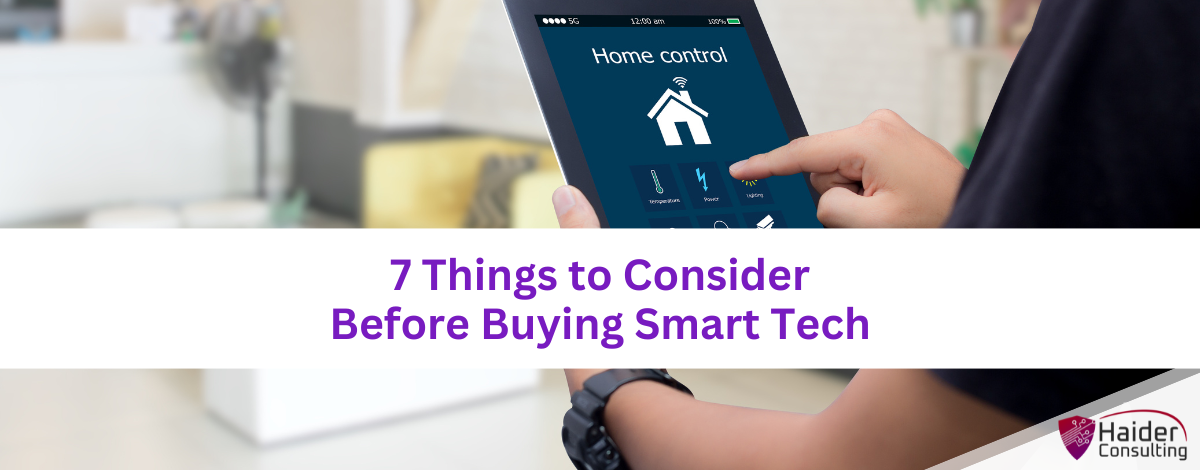Smart homes might feel like they’re from a futuristic film, with voice-activated lights, automatic thermostats, and even robot vacuums that clean on their own.
While this technology is appealing, don’t hurry to buy the latest devices just yet. Each one comes with it’s own set of pros and cons, and it’s important to carefully consider each one. These seven important questions can help you decide before you fully commit to new smart home technology.
1. Does it Solve a Real Problem?
Smart home gadgets vary greatly—some are incredibly useful, while others are just fun gadgets. Consider what parts of your daily life could be made easier with technology.
For example, if you always forget to turn off the lights, smart bulbs that turn off automatically could be really helpful. On the other hand, a smart toaster may not make much difference in your busy mornings.
2. Is It Compatible with Other Devices?
Smart home technology is like a cliquey school cafeteria—some devices just don’t get along with others. Most gadgets work with a central hub or specific app, so it’s important to pick ones that mesh well with what you already own or intend to buy.
Using different brands together can be aggravating if the devices don’t communicate well, or if you need multiple apps to control them. Checking for compatibility before you buy can prevent frustration.
Note: There’s hope for better compatibility in the future with the introduction of the new Matter standard.
3. Is Your Wi-Fi Up to the Challenge?
Smart homes need a lot of data and a strong Wi-Fi connection to work right. If your internet is slow, drops out, or can’t handle much data, your high-tech home might become more frustrating than fun.
Here are some issues that can happen with weak Wi-Fi:
- Smart lights might flicker on and off.
- Thermostats might not adjust properly.
- Voice assistants could respond slowly to your commands.
Before you buy any smart devices, think about improving your Wi-Fi setup. Upgrading your router or internet service can help manage the extra demand from your smart home devices.
4. Privacy Concerns Deserve Attention
Smart home devices know a lot about you. They track everything from when you turn on your lights to how warm you like your house. This data can help customize your experience, but some companies might sell your information to advertisers.
Before you buy a smart device, read its privacy policy carefully. Check what data it collects, how it uses this data, and whether you can control its sharing. If the privacy policy makes you uneasy, consider a different device that offers better protection for your information.
5. Security Matters: Protect Your Smart Home
Smart homes are convenient but they increase security risks. These devices connect to your Wi-Fi and can be hacked. Hackers might take control of your home or steal your personal information.
To protect yourself, pick devices with robust security features like encryption and two-factor authentication. Always update your devices to fix security weaknesses. Also, consider setting up a separate Wi-Fi network just for your smart devices. This separation from your personal devices adds an extra layer of security.
6. Future-Proofing Your Smart Home
Technology changes fast. Today’s advanced gadgets could be outdated tomorrow. When choosing smart home devices, consider the manufacturer’s track record for updates and ongoing support. Will they keep providing updates and security patches over time?
Avoid devices from companies that don’t consistently offer software updates. This helps ensure your smart home technology remains current and secure longer.
7. Start Small and Scale Up Gradually
Avoid trying to automate your entire home all at once. Smart home technology can be expensive, so it’s better to start slowly. Begin with a couple of key devices that solve specific problems or enhance your daily life, like smart lights or a thermostat. This way, you can get used to smart technology on a small scale before fully automating your home. This careful approach lets you test the value of these devices and fix any problems before making a bigger investment.
Make sure to think about these seven important questions before you buy smart home devices. This will help make your introduction to home automation successful.
Thinking of Setting Up Smart Tech in the Office?
Setting up a smart office yourself can be tricky and is rarely secure. If you need assistance from a tech expert, just reach out to us. We’ll help you analyze and secure your smart tech.
Get in touch with us today to discuss how we can help!
Book My 17-Minute Call





